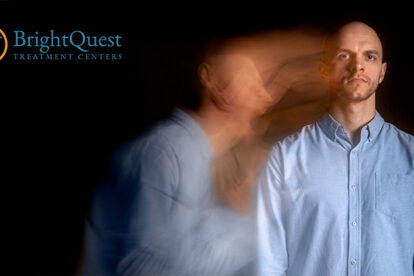
Schizophrenia
Schizophrenia is a complex mental illness that influences the way a person thinks about and processes information. Disruptions in thinking, communication, managing emotions, and making decisions can impact the behaviors of individuals suffering from schizophrenia. Medical diagnosis and a lifelong treatment plan, along with a strong support system, are essential for those living with schizophrenia.
What is Schizophrenia?
Schizophrenia is a severe mental health condition that causes a person to lose touch with reality, hallucinate, experience delusions, have disordered thoughts, and have difficulty communicating.
This disorder has a serious impact on a person’s life, impeding the ability to work or engage in everyday activities or manage relationships.
Schizophrenia is chronic and has no cure, but it is treatable and manageable. Most people who receive a diagnosis and stick with treatment get better and are able to go back to their normal routines and activities, living as independently as possible.
Schizophrenia can be described as a mental illness, a psychiatric disorder, or a brain disorder. Research has shown that people with this condition have altered brain structures and brain chemistry. Schizophrenia impacts how a person feels, thinks, and perceives the world.
The most characteristic effect of schizophrenia is psychosis, a state in which a person’s thoughts and perceptions are so distorted that they have lost contact with reality. Hallucinations, voices or visions that aren’t really there, and delusions, or false beliefs maintained in the face of contrary evidence, are typical.
Facts and Statistics
- More than 21 million people throughout the world have schizophrenia.
- Approximately 1 percent of Americans struggle with schizophrenia.
- Schizophrenia diagnoses are more common among men than women.
- The typical age of onset of symptoms for men is in the late teens to early 20s, while women are more likely to first experience symptoms of schizophrenia in their late 20s to early 30s.
- The lifetime risk of suicide in people with schizophrenia is 5 percent, meaning the risk that someone with this condition will attempt suicide at any point in their lives is 5 percent. The risk is higher, over 10 percent, for individuals with bipolar disorder.
- Ten percent of people with a first-degree relative (a sibling or parent) diagnosed with schizophrenia will also develop the condition.
- Among identical twins, if one twin is diagnosed with schizophrenia, the other twin has a 50 percent chance of also being diagnosed.
Symptoms of Schizophrenia
The symptoms of this disorder can be categorized in several ways: positive symptoms, negative symptoms, and cognitive symptoms. Positive symptoms are those that are not normally present, while negative symptoms are deficits, and cognitive symptoms affect thinking and mood.
Positive symptoms:
- Hallucinations can be auditory or visual and are images, visions, and voices that are experienced and perceived as real but are in fact not real. For instance, many people with schizophrenia believe someone who isn’t really there is talking to them.
- Delusions are thoughts or beliefs that are false but that persist despite evidence to the contrary. For example, a person with schizophrenia may be paranoid because he believes someone is following him or is out to get him.
- Disorganized thinking means a person’s thoughts jump from one to the next in an illogical way. This is manifested in disorganized communication, or speech that is disordered and doesn’t make sense.
- Abnormal behaviors may include any behavior that is not normal, such as acting childlike or being unusually agitated. They may also include physical movements or postures that are abnormal or inappropriate, even catatonic.
Negative Symptoms:
- Decreased emotions occur when a person seems flat or has no affect in his or her expressions or speech.
- Lethargy is characterized by lack of energy and an unwillingness or inability to complete tasks or ordinary activities.
- Depression-like symptoms are typical negative symptoms of schizophrenia and can often be mistaken for major depression. In addition to the above, these may include lack of interest in personal hygiene, relationships, and work.
Cognitive and Mood Symptoms:
- Cognitive difficulties include trouble with memory, difficulty being organized, or being unable to pay attention.
- Changes in mood are typical and may include excessive cheerfulness or sadness, or swings from one extreme to another.
- Anosognosia is common with schizophrenia and means a lack of insight, or a lack of awareness of being sick.
Subtypes of Schizophrenia
The most recent edition of the DSM, the manual used by psychiatrists to make diagnoses, left out subtypes of schizophrenia and instead recommends that a diagnosis of schizophrenia include detailed descriptions of symptoms and severity. In the previous edition there were five subtypes listed:
- Paranoid – Characterized by extreme delusions, suspicion of others, feelings of persecution, and a feeling of grandiosity
- Disorganized – Dominated by incoherent speech and thoughts, not necessarily delusional
- Catatonic – Extreme withdrawal and isolation with many negative symptoms
- Undifferentiated – A person who does not fit well into any of the three previous types
- Residual – Refers to someone with less severe or frequent symptoms
Causes and Risk Factors
The exact causes of schizophrenia are not known, but researchers studying brain scans and brain chemistry have determined that there are significant differences in the structure of the brain and in the prevalence of certain neurotransmitters in people diagnosed with the condition. Neurotransmitters are chemical messengers in the brain, and differences in dopamine and glutamate seem to be related to schizophrenia.
What is known is that there are schizophrenia risk factors that make it more likely a person will develop the condition. Family history is the most important of these. Having a family member with schizophrenia is one of the leading predictors for being diagnosed. Other risk factors include having an older father, having an autoimmune disease and chronic inflammation, and using psychoactive drugs, especially during adolescence.
Diagnosis
A diagnosis for schizophrenia typically begins with medical examinations and even imaging tests to rule out any physical conditions that may be causing the symptoms. A psychiatric evaluation is the next step and should be conducted by a mental health professional. If it is done by a general practitioner or other doctor, any diagnosis of schizophrenia should be confirmed by a psychiatrist who can provide the best expertise and treatment.
It is important to remember that certain drugs can cause symptoms of psychosis that mimic schizophrenia. An accurate diagnosis cannot be made until the patient has detoxed from any drugs they may have been using.
There are several criteria that must be met to be diagnosed with schizophrenia. These include experiencing at least two of the following symptoms regularly for a month or more:
- Delusions
- Hallucinations
- Disorganized speech
- Disorganized behaviors
- Negative symptoms
To be diagnosed the patient must also have significant social or work dysfunction as a result of symptoms, and symptoms must persist for six months or longer.
Learn to Live Independently With Schizophrenia
Our Unique Treatment Model can Help
Treatment for Schizophrenia
Schizophrenia must be treated. It will not get better without treatment. This is a chronic condition with no cure, but with manageable treatment options. A comprehensive treatment plan includes medication and psychotherapy. Medications are very important for treatment and are effective for most patients. Antipsychotics help manage many of the most prominent and troubling symptoms of the condition. Second generation antipsychotics are preferred because they cause fewer side effects. Examples of these are aripiprazole (Abilify), risperidone (Risperdal), olanzapine (Zyprexa), and quetiapine (Seroquel).
In addition to medications, patients can benefit from psychotherapy, typically in a one-on-one setting. A mental health professional can help a patient normalize patterns of thought and perceptions, manage relationships and social obligations, identify warning signs of psychotic episodes, and generally learn how to manage the illness. Therapy may also include group or family sessions.
A person living with schizophrenia may also engage in self-management strategies alongside therapy and medications. These include joining support groups, relying on family, using stress management techniques, making and working toward goals, getting job training and using social services like transportation and affordable housing.
Complications of Schizophrenia
In addition to treating the condition itself, schizophrenia can cause many complications that can also be treated to help a person develop a better quality of life. Complications may also be considered co-occurring disorders because it is not always possible to tell if schizophrenia caused the complication or if the two are simply more likely to occur together. Complications may include:
- Depression
- Suicide
- Self-injury
- Substance abuse
- Anxiety disorders
- Social isolation
- Inability to hold down a job or go to school
- Poverty and homelessness
- Being the victim of violence
- Incarceration
Outlook
The outlook for being diagnosed with schizophrenia is generally good. Most patients who receive treatment for schizophrenia will improve and many will be able to return to a normal lifestyle with the ability to work and live independently. Medications and other types of treatment and support are essential for reducing symptoms and allowing a patient to function more normally. Sometimes it takes time to find the medication that works best for each individual, but eventually most will find the right drug that provides maximum benefit with the fewest side effects.
Schizophrenia is a very serious mental health condition and brain disorder. It is essential that someone exhibiting any of the signs of this disorder get professional help. There can be extreme and negative consequences of never being correctly diagnosed or treated. It is crucial for loved ones to recognize troubling signs in another and to get help for that person. It isn’t always easy to identify the signs of mental illness in oneself. With a professional diagnosis and a treatment plan, there is every possibility of living a normal life again and feeling well again.
Why Choose BrightQuest for Schizophrenia Treatment?
We know that choosing the right treatment option for yourself or a loved one is difficult. We believe our unique model of care gives our clients the best chance at success.
- Family Integration in Treatment
- Inclusive Therapeutic Community
- Focus on Lasting Behavioral Change
We offer clients the tools, skills, and support necessary to attain greater stability and independence with the confidence and courage to live a healthy, happy, and productive life.






